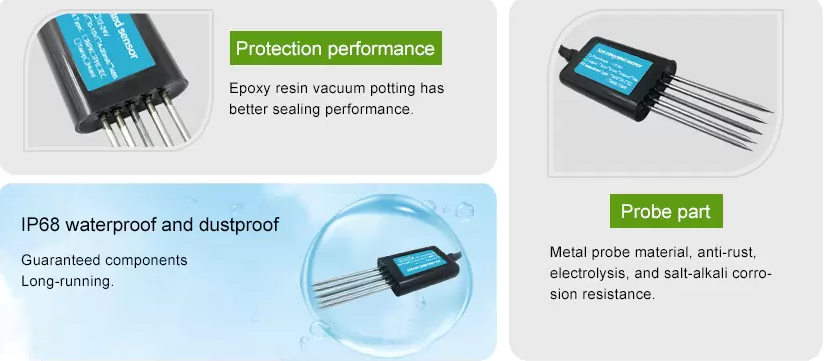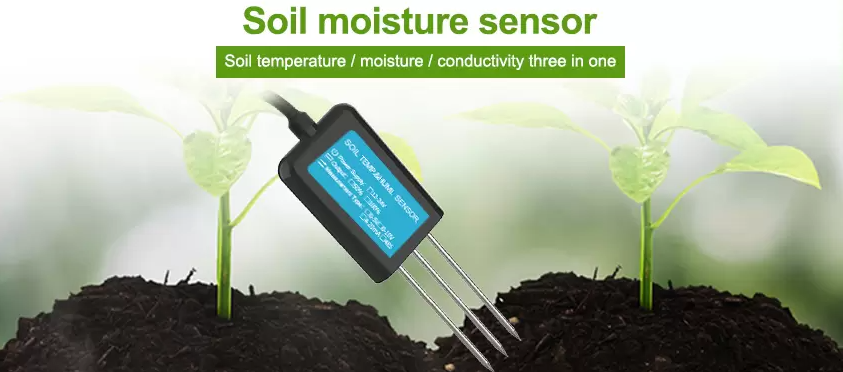Soil moisture probe have become as indispensable tools for modern agriculture, revolutionizing the way farmers monitor, manage, and optimize irrigation practices. These advanced devices provide real-time insights into soil moisture levels, enabling farmers to make data-driven decisions that enhance water efficiency, crop yield, and overall agricultural productivity. This article aims to explore the significance, functionality, applications, and benefits of soil moisture probes in precision irrigation and crop management, shedding light on their pivotal role in sustainable and efficient agricultural practices.
Significance of Soil Moisture Probes in Agriculture

The significance of soil moisture probe in agriculture lies in their ability to address the critical need for precise and efficient irrigation management. By accurately measuring soil moisture content at various depths and locations within the root zone, these probes empower farmers to optimize their irrigation strategies, minimize water wastage, and ensure that crops receive the appropriate amount of moisture for healthy growth. In the context of increasingly variable climate patterns and water scarcity concerns, the adoption of soil moisture probes is instrumental in promoting sustainable water use and mitigating the impact of drought conditions on agricultural productivity.
Functionality and Operation of Soil Moisture Probes
Soil moisture probes operate on the principle of measuring the dielectric constant of the soil, which is directly related to its moisture content. These probes are equipped with sensors that are inserted into the soil at different depths, allowing them to capture real-time data on soil moisture levels. The collected data is then transmitted to a central monitoring system, where it is analyzed to provide insights into the spatial and temporal variability of soil moisture within the agricultural field.

Furthermore, modern soil moisture sensor often integrate additional environmental sensors, such as temperature and salinity sensors, to provide a comprehensive understanding of soil conditions. This multi-sensor approach enables farmers to assess not only soil moisture levels but also the impact of temperature and salinity on crop health, thereby facilitating informed decision-making in irrigation and crop management practices.
Applications of Soil Moisture Probes
The applications of soil moisture probes encompass a wide range of agricultural settings, including field crops, orchards, vineyards, and greenhouse operations. In field crop management, these probes play a crucial role in optimizing irrigation scheduling, preventing overwatering or underwatering, and promoting efficient water use. Similarly, in orchards and vineyards, soil moisture probes aid in tailoring irrigation practices to the specific needs of fruit-bearing trees and vines, thereby contributing to improved fruit quality and yield.

Moreover, the integration of soil moisture probes in greenhouse operations enables precise control of irrigation and fertigation systems, ensuring that plants receive the ideal moisture levels for optimal growth. Additionally, soil moisture probes find application in research and experimental agriculture, where they facilitate the collection of data for studying the impact of varying soil moisture levels on different crop varieties and agricultural practices.
Benefits of Soil Moisture Probes in Precision Irrigation
The adoption of soil moisture probe offers a myriad of benefits for farmers and agricultural operations. Firstly, these probes enable precise irrigation management, leading to water savings, reduced energy costs, and minimized environmental impact. By aligning irrigation practices with actual soil moisture conditions, farmers can avoid waterlogging, leaching of nutrients, and other issues associated with improper irrigation, thereby promoting the sustainable use of water resources.
Furthermore, soil moisture probe support the implementation of precision agriculture techniques, allowing for site-specific irrigation adjustments based on localized soil moisture data. This targeted approach to irrigation management enhances crop uniformity, minimizes water stress, and ultimately contributes to improved crop yield and quality. Additionally, the data collected from soil moisture probes can be integrated with crop modeling and decision support systems, enabling farmers to make informed decisions regarding irrigation, fertilization, and overall crop management.
Conclusion
In conclusion, soil moisture probes have become essential instruments for modern agriculture, offering invaluable insights into soil moisture dynamics and enabling precision irrigation and crop management. Their functionality, applications, and benefits underscore their significance in promoting water-efficient, sustainable agricultural practices. As the agricultural industry continues to embrace technology-driven solutions for optimizing productivity and resource utilization, soil moisture probes stand out as indispensable tools for enhancing agricultural efficiency, conserving water, and ensuring the long-term viability of farming operations.
